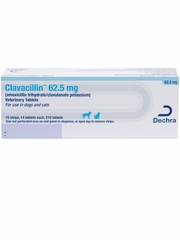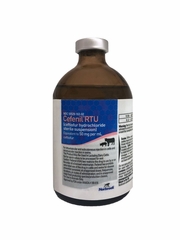SAVE 20% OFF 20% OFF Use Code PREZ20 *
Antibiotic
There are several antibiotics commonly prescribed for pets to treat bacterial infections. It's important to note that you should never administer antibiotics to your pet without consulting a veterinarian first. The appropriate antibiotic and dosage will depend on the specific condition and needs of your pet. Here are a few commonly used antibiotics for pets:
- Amoxicillin: This is a broad-spectrum antibiotic that is effective against a wide range of bacterial infections in pets. It is commonly used to treat skin infections, respiratory tract infections, urinary tract infections, and some dental infections.
- Cephalexin: Cephalexin is another broad-spectrum antibiotic commonly prescribed for pets. It is often used to treat skin and soft tissue infections, urinary tract infections, and respiratory infections.
- Enrofloxacin: This antibiotic belongs to the fluoroquinolone class and is effective against a broad range of bacterial infections. It is commonly used to treat urinary tract infections, respiratory infections, and some skin infections. Enrofloxacin is more commonly prescribed for dogs and may have restrictions or caution for use in cats.
- Clindamycin: Clindamycin is an antibiotic that is often used to treat deep skin infections, dental infections, and bone infections in pets. It is effective against certain types of bacteria, including those that can cause abscesses.
- Metronidazole: Metronidazole is an antibiotic with antiprotozoal properties. It is commonly used to treat gastrointestinal infections, such as diarrhea caused by certain types of bacteria or parasites.
Remember, the dosage and duration of treatment will vary depending on the specific condition being treated, the severity of the infection, and the weight and overall health of your pet. It's crucial to consult with a veterinarian who can properly diagnose your pet's condition and prescribe the appropriate antibiotic and treatment plan.






![Antirobe for Dogs - Aquadrops 25 mg/ml (20ml) (Manufacturer may vary) - [Antibiotic]](https://s.turbifycdn.com/aah/yhst-135855760451349/antirobe-aquadrops-25-mg-ml-20ml-manufacturer-may-vary-11.jpg)






![Baytril for Cattle - [Bacterial Antibiotic]](https://s.turbifycdn.com/aah/yhst-135855760451349/baytril-100-inj-33.jpg)


![Clavamox Drops for Dogs & Cats - 15 mL- [Amoxicillin + Clavulanate]](https://s.turbifycdn.com/aah/yhst-135855760451349/clavamox-drops-for-dogs-cats-60.jpg)





![Cefa-Drops [Cefadroxil] (Manufacturer may vary)](https://s.turbifycdn.com/aah/yhst-135855760451349/cefa-drops-cefadroxil-manufacturer-may-vary-9.jpg)


















![Amoxicillin for Dogs & Cats - 125-mg, 100 Chewable Tablets [Bacterial Infections]](https://s.turbifycdn.com/aah/yhst-135855760451349/amoxicillin-for-dogs-cats-125-mg-100-chewable-tablets-bacterial-infections-1.jpg)
![Clarithromycin Oral Suspension for Dogs & Cats - 125mg/5mL - 50 ml - [Respiratory Health]](https://s.turbifycdn.com/aah/yhst-135855760451349/clarithromycin-oral-suspension-125mg-5ml-50-ml-11.jpg)

![SMZ-Med for Cattle, Swine, Chickens & Turkeys - 454 Soluble Powder (Sodium Sulfamethazine) - [Diseases Treatment]](https://s.turbifycdn.com/aah/yhst-135855760451349/smz-med-454-soluble-powder-sodium-sulfamethazine-57.jpg)


![LinxMed-SP for Swine & Poultry - Soluble Powder 40gm - (Lincomycin) - [Antibiotic]](https://s.turbifycdn.com/aah/yhst-135855760451349/linxmed-sp-soluble-powder-40gm-lincomycin-57.jpg)
![LinxMed-SP for Swine & Poultry - Soluble Powder 80gm - (Lincomycin) - [Antibiotic]](https://s.turbifycdn.com/aah/yhst-135855760451349/linxmed-sp-soluble-powder-80gm-lincomycin-57.jpg)
![LinxMed-SP for Swine & Poultry - Soluble Powder 160gm - (Lincomycin) - [Antibiotic]](https://s.turbifycdn.com/aah/yhst-135855760451349/linxmed-sp-soluble-powder-160gm-lincomycin-57.jpg)
![LinxMed-SP for Swine & Poultry - Soluble Powder 480gm - (Lincomycin) - [Antibiotic]](https://s.turbifycdn.com/aah/yhst-135855760451349/linxmed-sp-soluble-powder-480gm-lincomycin-72.jpg)
![LinxMed-SP for Swine & Poultry - Soluble Powder 2 lb - (Lincomycin) - [Antibiotic]](https://s.turbifycdn.com/aah/yhst-135855760451349/linxmed-sp-soluble-powder-2-lb-lincomycin-52.jpg)
![PenAqua for Turkeys - Sol-G 0.5BU - (Penicillin G Potassium) (11.4oz Pouch) - [Erysipelas Treatment]](https://s.turbifycdn.com/aah/yhst-135855760451349/penaqua-sol-g-0-5bu-penicillin-g-potassium-11-4oz-pouch-52.jpg)



![GentaMed for Swine - Soluble Powder (360 gm) - [Colubacillosis Treatment]](https://s.turbifycdn.com/aah/yhst-135855760451349/gentamed-soluble-powder-360-gm-52.jpg)
![Neo-Sol 50 for Animals - (100 gram) - [Antibiotic]](https://s.turbifycdn.com/aah/yhst-135855760451349/neo-sol-50-100-gram-52.jpg)
![Neo-Sol 50 for Animals - (2000 gram) - [Antibiotic]](https://s.turbifycdn.com/aah/yhst-135855760451349/neo-sol-50-2000-gram-52.jpg)
![Lincomycin for Swine - Hydrochloride Soluble Powder (80 gram) - [Infections Treatment]](https://s.turbifycdn.com/aah/yhst-135855760451349/lincomycin-hydrochloride-soluble-powder-80-gram-61.jpg)
![Lincomycin for Swine - Hydrochloride Soluble Powder (160 gram) - [Infections Treatment]](https://s.turbifycdn.com/aah/yhst-135855760451349/lincomycin-hydrochloride-soluble-powder-160-gram-67.jpg)
![Sulmet Solution for Animals - Pail (1 lb packets, 20 count) - [Antibiotic]](https://s.turbifycdn.com/aah/yhst-135855760451349/sulmet-solution-pail-1-lb-packets-20-count-12.jpg)
![Neo-Sol 50 for Animals - (500 gram) - [Antibiotic]](https://s.turbifycdn.com/aah/yhst-135855760451349/neo-sol-50-500-gram-57.jpg)


![Lincomycin for Swine - Hydrochloride Soluble Powder (480 gram) - [Infections Treatment]](https://s.turbifycdn.com/aah/yhst-135855760451349/lincomycin-hydrochloride-soluble-powder-480-gram-57.jpg)













